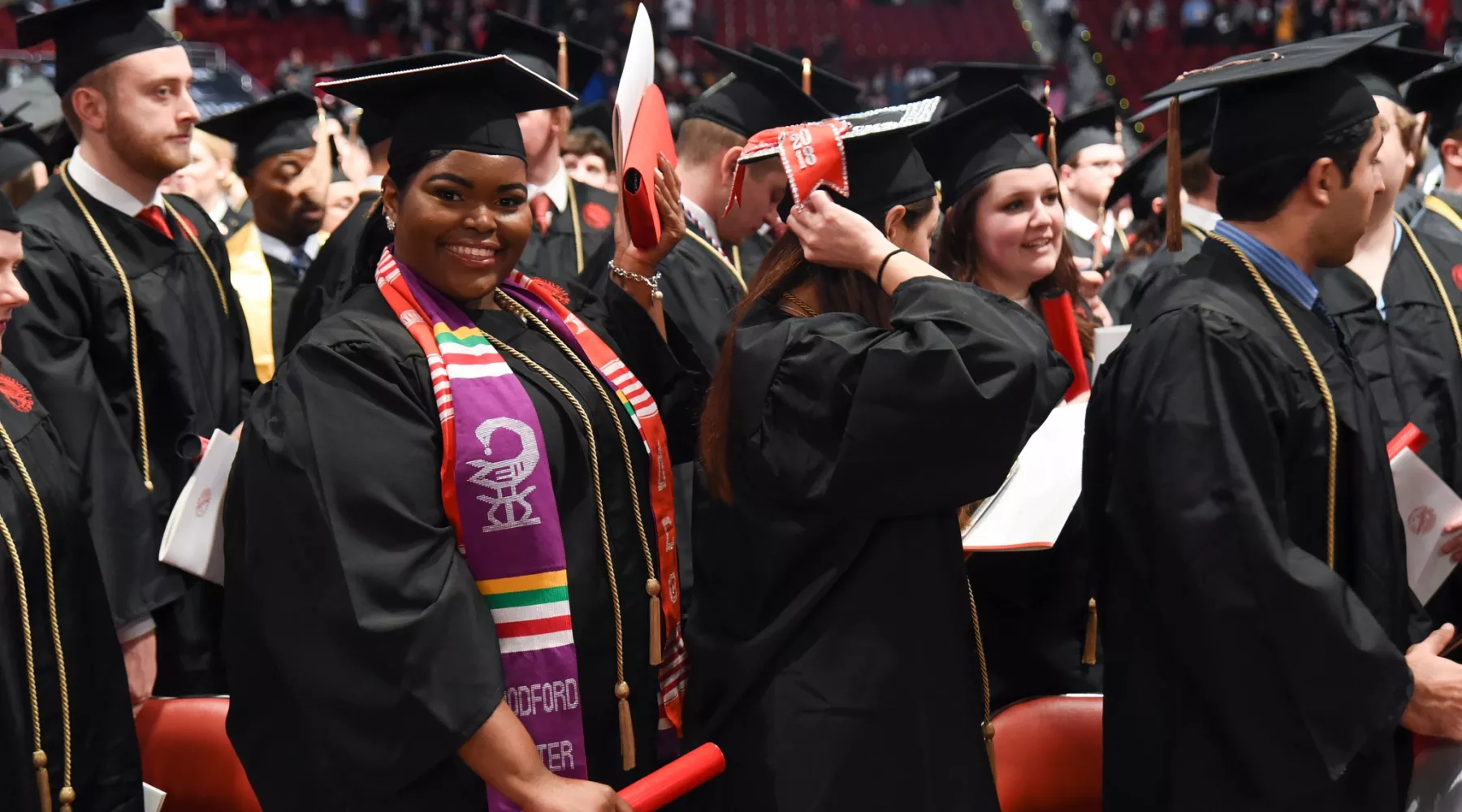
Types of Credentials
Explore the types of academic recognition UofL offers. Learn who awards them, how long they take, whether they use credit, and the purpose each credential is designed to fulfill.
Types of credentials offered at UofL
At a glance | |
|---|---|
| Credit bearing coursework permitted | No |
| Official Board of Trustees (BOT) issued credential | No |
| Credentialing agent | UofL academic or administrative unit |
| Target population | Open to anyone. Credentialing agent sets admission requirements. |
Definition
Professional and workforce development credentials represent the completion of workforce development and learning opportunities designed for both external and UofL (i.e., students, faculty, and staff) audiences who wish to expand their professional skills, develop new competencies, and engage in life-long learning. Programs may be offered both by academic and administrative units, but such credentials do not carry academic credit, and they do not lead to the awarding of a UofL Board of Trustees (BOT) issued and/or recognized credential. Professional and workforce development programs leverage UofL faculty and staff expertise to enrich and empower the UofL, Louisville Metropolitan Service Area, and global communities. These credentials may utilize the terms “endorsement,” “recognition,” “completer,” “participant,” “demonstrated competency,” “demonstrated mastery,” “qualified,” or other terms recognized and appropriate for the academic discipline and/or associated industries.
Admissions
Admissions requirements are established by the academic or administrative unit offering the credential and accurately reflect the requisite knowledge, skills, and abilities individuals must possess to be able to successfully complete the course of study. Admission is open to both internal and external audiences, and participants do not have to be admitted as students to UofL.
Program length
Program length for professional and workforce development credentials is not measured according to the standard credit-hour, but instead is measured according to contact hours. The minimum contact hours required to receive a professional and workforce development credential are determined by the academic and administrative unit consistent with their academic discipline and/or professional expertise and aligned with industry and/or professional standards.
Recognition requirements
The minimum requirements to be awarded a professional and workforce development credential are established by the academic or administrative unit offering the badge. The minimum level of student engagement and mastery of course materials is commensurate with expectations within the academic discipline according to the professional expertise of the unit offering the credential and aligned with industry and/or professional standards.
Available professional and workforce development credentials
Find more information about available professional and workforce development credentials and trainings at UofL:
Academic / | Provider |
|---|---|
| College of Arts and Sciences | |
| College of Business | |
| College of Education and Human Development | Study of Knowledge Initiatives for Learning, Leadership and Success (SKILLS) Collaborative |
| Delphi Center for Teaching and Learning | |
| Office of Research and Innovation | |
| Kent School of Social Work and Family Science | |
| School of Dentistry | |
| School of Medicine |
At a glance | |
|---|---|
| Credit bearing coursework permitted | Yes (permitted - not required) |
| Official Board of Trustees (BOT) issued credential | No |
| Credentialing agent | External agency from UofL (e.g., industry partner, professional agency, etc.) |
| Target population | If using credit bearing coursework, the individual must be an admitted UofL student. If using non-credit bearing coursework, open to anyone with UofL academic or administrative unit setting the admissions requirements. |
Definition
Industry-awarded credentials recognize achievement in a curricular pathway that may or may not be based upon for-credit coursework. These credentials are not awarded by UofL. They are awarded by an external entity according to their standards, and UofL is merely the avenue by which the student can demonstrate mastery. They may utilize whatever terminology is recommended by the agency, but the badge must make clear who is the awarding agency (e.g., SAS) and that UofL is simply a provider/agent (e.g., “at UofL,” “through UofL,” “in association with UofL,” etc.).
Admissions
If the credential is utilizing for-credit coursework, the student must be admitted according to the standard admissions procedures and minimum admission requirements based upon the student’s status with UofL. If the credential is utilizing not-for-credit coursework, admissions requirements are established by the academic or administrative unit offering the credential based upon the requirements of the external agency and accurately reflect the requisite knowledge, skills, and abilities individuals must possess to be able to successfully complete the course of study.
Program length
The minimum program length is determined according to the external agency through which the credential is being awarded.
Recognition requirements
The minimum requirements to be awarded an industry-awarded credential are determined according to the external agency through which the credential is being awarded.
At a glance | |
|---|---|
| Credit bearing coursework permitted | Yes (required) |
| Official Board of Trustees (BOT) issued credential | Yes |
| Credentialing agent | UofL Board of Trustees (BOT) |
| Target population | Individuals who are admitted to UofL as degree-seeking or credential-seeking students. |
Definitions
UofL offers two (2) BOT-issued non-degree credentials that utilize for-credit coursework: certificates and graduate certificates. Certificates are an academic program below the baccalaureate degree. At UofL, these programs generally require less than 30 credit hours. Graduate certificates include any organized program of study above the baccalaureate level that do not result in the issuance of a degree. These programs include postbaccalaureate certificates, post-masters certificates and post-professional certificates according to the Kentucky Council on Postsecondary Education (CPE) definitions.
Undergraduate certificates
For more information about admissions, program length, graduation requirements, available programs and other important policy and procedural information related to the conferring of these credentials, visit the Undergraduate Academic Catalog.
Graduate certificates
For more information about admissions, program length, graduation requirements, available programs and other important policy and procedural information related to the conferring of these credentials, visit the Graduate Academic Catalog.
At a glance | |
|---|---|
| Credit bearing coursework permitted | Yes (required) |
| Official Board of Trustees (BOT) issued credential | Yes |
| Credentialing agent | UofL Board of Trustees (BOT) |
| Target population | Individuals who are admitted to UofL as degree-seeking students. |
Definitions
UofL offers several BOT-issued degree credentials that utilize for-credit coursework. These degrees are categorized according to the Kentucky Council on Postsecondary Education (CPE) as follows:
Bachelors degree
- An undergraduate academic award requiring at least 120 semester credit hours or the equivalent.
- Examples: Bachelor of Arts (B.A.), Bachelor of Science (B.S.), Bachelor of Business Administration (B.B.A.), etc.
Masters degree
- A graduate academic award requiring the successful completion of at least 30 credit- hours beyond a baccalaureate degree.
- Examples: Master of Arts (M.A.), Master of Science (M.S.), Master of Education (M.Ed.), Master of Music (M.M.), etc.
Specialists degree
- Requires approximately 45 credit hours of concentrated and approved graduate coursework beyond a baccalaureate degree. It is generally offered in the field of education to acknowledge completion of advanced graduate study designed to help individuals meet licensure requirements or develop additional knowledge and skill beyond the masters degree but not at the doctoral level.
- Examples: Educational Specialist (Ed.S.)
Doctoral degree in professional practice
- A graduate degree conferred upon completion of a program providing the knowledge and skills for the recognition, credential or licensure required for professional practice. The degree is awarded after a period of study such that the total time to the degree, including both pre-professional and professional preparation, equals at least six full-time equivalent academic years.
- Examples: Juris Doctor (J.D.), Doctor of Social Work (D.S.W.), Doctor of Audiology (Au.D.), Doctor of Medicine (M.D.), etc.
Doctoral degree in research / scholarship
- A graduate degree requiring advanced work beyond the masters level, including the preparation and defense of a dissertation based on original research, or the planning and execution of an original project demonstrating substantial artistic or scholarly achievement.
- Examples: Doctor of Philosophy (Ph.D.), Doctor of Education (Ed.D.), etc.
Undergraduate degrees
For more information about admissions, program length, graduation requirements, available programs and other important policy and procedural information related to the conferring of these credentials, visit the Undergraduate Academic Catalog.
Graduate degrees
For more information about admissions, program length, graduation requirements, available programs and other important policy and procedural information related to the conferring of these credentials, visit the Graduate Academic Catalog.
Professional degrees
For more information about admissions, program length, graduation requirements, available programs and other important policy and procedural information related to the conferring of these credentials, visit the Professional School Catalogs/Bulletins.

